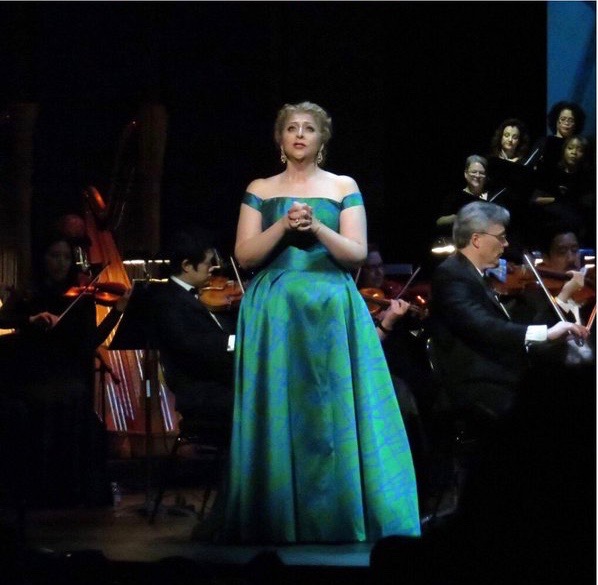Goerke lights up WNO gala with a night of memorable Wagner singing

Christine Goerke performed at Washington National Opera’s gala concert Saturday night at the Kennedy Center.
Opera gala performances generally disappoint. These events are invariably glitzy but poorly rehearsed affairs, offering middling repertoire and boring and gratuitous speeches.
Washington National Opera achieved the rare exception to this rule with a surprisingly excellent gala concert at the Kennedy Center Opera House Saturday evening. A tribute to the company’s former board chairman, John Pohanka, the program featured a generous serving of Wagner, one of the honoree’s musical loves.
Soprano Christine Goerke topped the billing, appearing in spectacular vocal form (and with regular gown changes). She entered with Elisabeth’s “Dich, teure Halle” from Tannhäuser, filling the large hall with ample, luxurious tone. The excitement stoked by her singing grew in intensity with the ecstatic calls of “Sei mir gegrüsst!” at the work’s conclusion.
Later Goerke attacked Eboli’s “O don fatale” from Verdi’s Don Carlo with even more blistering force and creamy legato, making this aria a thundering paean to regret. She was also the highlight of the Intermezzo and Easter Hymn from Mascagni’s Cavalleria rusticana, rising over the dawn-rose softness of the orchestra and chorus.
Bass-baritone Alan Held was at his best in Wolfram’s “O du mein holder Abendstern,” also from Tannhäuser. He combined a gloomy darkness of tone in the introduction and a honeyed legato in the main section, compressed in dynamic but radiant.
The only real misstep on the program was a tossed-off rendition of the Papageno-Papagena duet from Mozart’s The Magic Flute, combining Held and Goerke. Though even here the duo made up for a lack of comfort stylistically with good old-fashioned hamminess.
Washington favorite Soloman Howard, formerly of the Domingo-Cafritz Young Artist program, lent his resonant bass to Fiesco’s “Il lacerato spirito” from Verdi’s Simon Boccanegra. Howard’s low notes rang out with fullness, and he had more than enough power to communicate the character’s rage and sorrow, even competing with the WNO Chorus, arranged behind the Kennedy Center Opera House Orchestra on stage.
Soprano Latonia Moore, currently starring in the second cast of WNO’s production of Tosca, gave a taste of what to expect when she sings the role of Serena in next season’s production of Gershwin’s Porgy and Bess. Her rendition of the character’s poignant aria “My Man’s Gone Now” was tender and understated, building in volume to a grief-stricken conclusion.
Actress and musical theater star Christine Ebersole provided humor and charm as the evening’s hostess. She reminded the audience that she once played an opera singer in the film Amadeus, although the singing was done by someone else. After making jokes about her own voice, she took up the microphone twice to sing musical numbers with the orchestra, starting with a hilarious rendition of “The Saga of Jenny” from musical Lady in the Dark by Kurt Weill.
In the title song from Burton Lane’s “On a Clear Day You Can See Forever,” Ebersole was perhaps hampered by the lack of fast-paced comic repartee. Still it is generally better to have musical theater specialists sing this kind of material. Soloman Howard returned to sing “Some Enchanted Evening,” from Rodgers and Hammerstein’s South Pacific, and without the microphone the balances proved challenging with the orchestra.
The orchestra sounded plush and unified in its relatively rare ascent from the pit. In the opening number, the “Entry of the Guests” from Wagner’s Tannhäuser, three trumpets intoned the brilliant fanfares from the corner of the first balcony in the house. The placement of the chorus far at the back of the stage wreaked havoc on the blend, as individual voices jarringly popped out of the texture.
At the podium Evan Rogister, recently appointed WNO’s principal conductor, led with outsized gestures and strange contortions. He appeared most fluent in the lighter repertoire, but the Wagner pieces seemed not as comfortable a fit.
This was especially regrettable in the unforeseen conclusion of this most unusual of gala concerts, Christine Goerke’s astounding Immolation Scene from Wagner’s Götterdämmerung.
Having just completed a critically acclaimed run as Brünnhilde in the Metropolitan Opera’s Ring Cycle, Goerke was phenomenal, lifting the hearts of her listeners to apocalyptic heights. The beauty and power of the orchestra were there to respond, if only Rogister could have woven it into something truly memorable rather than merely solid.


